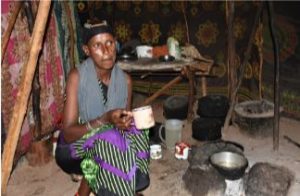
Cash Transfer-Bridging the food gap
Kame Mamo Dido, is a 32-year-old widow and a mother of 5 children. Her youngest child is barely 9 months old. She comes from Bubisa ward and she is a beneficiary of the unconditional cash transfer supported by CBM. Kame was chosen by the community as she is partially deaf and has her safety net negatively affected by the drought. In recent years, she has been living harmoniously with her in-laws who have always been supporting her and her children after the death of her husband. They have been rearing goats and diligently sharing the proceeds from the sale to sustain their livelihoods. They have been living as neighbours and looking after each other’s welfare.They formed this cooperation to mitigate social and economic risks.
Due to the prolonged drought, their goats have largely perished due to lack of water and pasture and the remaining few are very weak and can neither be sold nor consumed. This phenomenon has caused great strain on the family dynamics. There is no much to share comfortably anymore.
“The situation is bad for everyone here and there is nothing much to expect from anyone. It would have been a great burden to all if I had not received the cash to sustain my family. I was able to buy food in bulk and plan for our meals. It is actually much cheaper than retail buying and there is less stress knowing that I have food in
stock to feed my children,” she says.
Pastoralists live communally and are known for their generosity and reliability, especially towards their kin. In instances like Kame’s where the extended family is willing to pool their resources and share but are constrained by the negative effects of drought, emergency interventions like the cash transfer help to reduce the vulnerability of households by tackling food insecurity and sustaining their livelihood in the face of the raging drought. These interventions also help close the gap between the existing living condition and the expected standard, which will be realized once the risks have been mitigated.
PACIDA Supported my Family at its Lowest Moment
 In the heart of Chalbi Desert, the only true desert in Kenya, lies Maikona Village. This is an area that very few Kenyans can locate on map. If Darwin needed a location test his evolutionary theory of survival for the fittest, this
In the heart of Chalbi Desert, the only true desert in Kenya, lies Maikona Village. This is an area that very few Kenyans can locate on map. If Darwin needed a location test his evolutionary theory of survival for the fittest, this
would have been the area. Life here is tough in every sense. During daytime, winds blow pebbles and pebbles of sand and dust. Then sweltering heat takes over, converting the sand and ground to be a furnace for bare-footed locals. The nights are ice-cold.
Atho Barako grew up here. Her life, a script of how tough life can be, but also a test of human resilience and will. In 2014, after several doctor visits, he received the bad news: “you have cancer.” It felt like her life crashed. “I saw darkness all around me, as hope dried up, like the land I was brought up in,” she says.
“I used to wash clothes for other people and get paid to survive. Now, here I was, ravaged by this disease and weakened. I couldn’t do it anymore,” she adds. Her survival and that of her several children rested on the narrow shoulders of her husband – a burden too heavy for one. Against all odds, her husband worked really hard, putting
food on the table and educating her children, like any father would.
But then, as fate would have it, two years ago, he was involved in a road accident and was rendered helpless. “All the strength that my husband had that was the fortress of our survival. I had never seen him that helpless. We had been both hit in the worst possible way,” Atho says.
Aware of her challenges, PACIDA took up her children and is currently sponsoring their education. The organisation has also supported her through its cash transfer programme.
“PACIDA supported my family in its lowest moment. We had given up. They are now educating my children. There is no way I would have taken them to school. Now I have hope that these children will have a better future than us and may be lift us out of this indignity of poverty, she says.”
Visit Us
Marsabit Kenya
pacida@pacida.org
Call Us
+254 (0) 20 265 6947
About Pacida
The Pastoralist Community Initiative and Development Assistance (PACIDA) is a development and relief organisation that empowers pastoralist communities through sustainable community-driven development interventions.
PACIDA was founded in 2008 by local scholars and development practitioners who were concerned about the huge and widening humanitarian needs, deepening vulnerabilities and huge development gap in its target region.
Contact us
Postal Address: PO Box 333-60500, Marsabit, Kenya.
Email: pacida@pacida.org
Hotline: +254 (0) 20 265 6947
